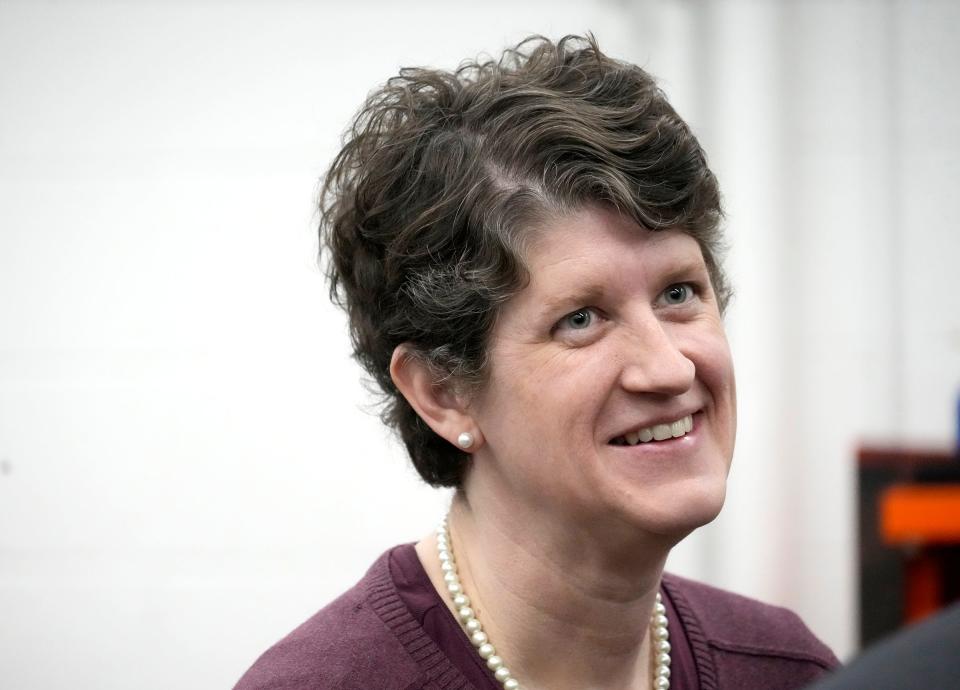State Superintendent Jill Underly: Wisconsin has 'more than enough money' to fund public schools

Wisconsin's top K-12 education official made an impassioned call Thursday to increase funding for the state's public schools, at times pounding the lectern and wiping tears from her eyes.
"Let me be clear: We have more than enough money in this state to fully fund our public schools, and it’s time we used it," said Jill Underly, state superintendent of public instruction, in her annual state of education address at the Wisconsin State Capitol.
She used the platform to send the message that all people should feel they belong in public schools. But to make that happen, the schools need more resources.
"It's about priorities," she said.
Increasing general state funding for public schools
In the most recently approved state budget, lawmakers agreed to a $1 billion increase in K-12 school funding through a mix of new funding and property tax increases. The budget allows schools to spend an additional $325 per student in the 2023-24 and 2024-25 years, respectively, an amount that falls below inflation.

Underly referenced data showing that this year, a historic 120 school districts statewide are asking voters for approval to borrow and raise more money through referendums. She said most schools have gone, are going, or will be forced to go to referendum "just to make ends meet."
Underly specifically called attention to Wisconsin's budget surplus — estimated at $3.1 billion at the end of the 2024-25 fiscal year — saying it's possible to increase state revenue limits on public schools while still keeping property taxes flat.
"Rebuilding Wisconsin’s strong, high-quality public education system requires that we adequately and equitably fund our public schools," Underly said.
Too many young teachers are leaving their jobs
Underly highlighted a disturbing trend in particular for new teachers: Only about 6 in 10 remain employed in Wisconsin six years after starting in the profession. Even fewer stay with their initial district or school, according to a 2022 state report.
"We cannot continue down this path and still expect quality educational outcomes for our kids," Underly said.
Numbers like those should be a wake-up call, she said.
The median salary for a Wisconsin teacher is $57,000. Including benifits, the median total compensation for teachers has fallen 19% between 2010 and 2022, the same report found.
"If we want to keep our teachers — the ones who make such a huge impact on the lives of our kids — we need to pay them for the important work they do," Underly said. "Pay them. It's a no-brainer."
Youth in Wisconsin are in mental health 'crisis'
When she got to the topic of mental health, Underly brushed tears from her eyes.
She cited data from a 2023 state report showing more than 1 in 3 Wisconsin high school students reported feeling sad and hopeless, and nearly 1 in 5 were considering suicide. Numbers like those illustrate an "alarming and profound" mental health crisis among youth, Underly said, especially among LGBTQ students.
More: Despite increased focus on mental health, myths and misunderstanding still common
"Each day these kids carry an incredible burden. They're worried about their parents, about their friends and their teachers, and they're worried about school violence," she said.
The DPI's upcoming budget request will "again ask" to increase the pool of money that can be used for in-school mental health resources, Underly said.
"We know what works, so let's fund it," she said.
Underly: state should double its reimbursement for special education
In Wisconsin, the state reimburses K-12 public schools for only about one-third of special education costs.
But the law requires public schools to provide for the needs of students with disabilities, meaning districts must use funding from their general aid to cover the gap.
Underly said it's imperative that the state Legislature increase funding for special education to at least 60%.
Gov. Tony Evers has also called for a 60% reimbursement rate; some special education advocates say that rate should be 90%.
"Investment to support our teachers, special education, mental health — these are interconnected, and will help us stem the tide of teacher attrition," Underly said.
Removing books from school libraries
Underly also noted ongoing efforts in Wisconsin, and across the U.S., to remove certain books from school libraries.
"It's time to stop playing games that hurt our students," she said. "No one wins when folks get whipped up in a frenzy. No one wants school libraries to promote indoctrination or bullying. But that's what a small group of disgruntled individuals are actually doing."
Literacy education
Act 20, signed into law in July 2023, requires young elementary students to get "science-based" reading curriculum with a focus on phonics.
But Underly said the state Legislature has yet to release most of the funding needed to help schools implement the law, leaving already-struggling public schools to fund the mandate themselves.
"Our kids deserve better. And I want to stand firmly, with no malice, on behalf of the state's children and educators. State legislators: Release the funding," she said.
Cleo Krejci covers education and workforce development as a Report For America corps member based at the Milwaukee Journal Sentinel. Contact her at [email protected] or follow her on Twitter @_CleoKrejci. For more information about Report for America, visit jsonline.com/rfa.
This article originally appeared on Milwaukee Journal Sentinel: Underly: Legislature's poor funding for K-12 schools is a choice
Solve the daily Crossword

